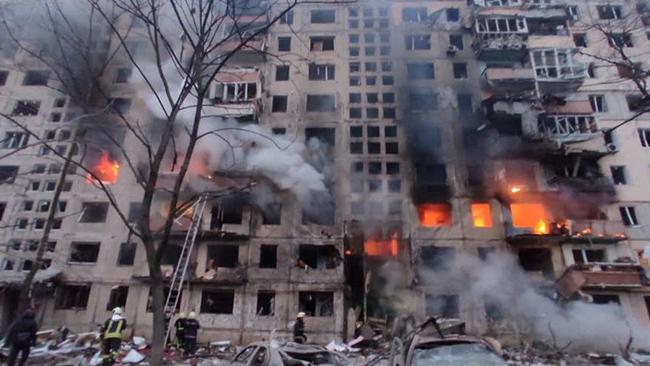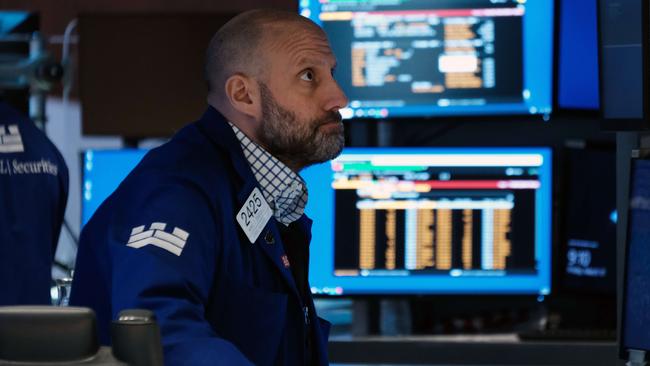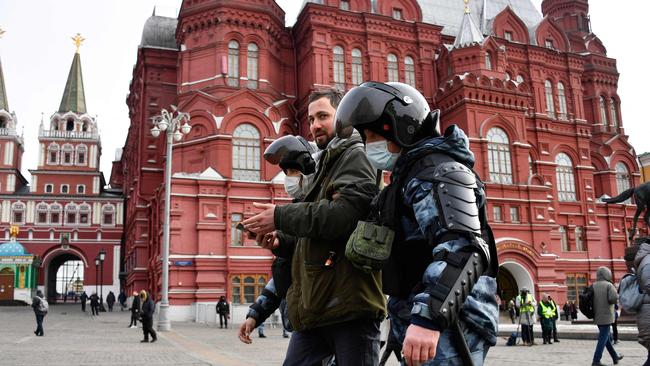Russian bond fears push markets closer to dangerous edge
As stress rises on Russia’s financial system, the risk of financial contagion becomes real again through Europe.

Global markets are edging toward a dangerous moment with two Russian bonds due for repayment later this week.
With Putin’s Russia starved of hard currency following a wave of sanctions and western business exits, Moscow this month said it expects bonds including corporate bonds to be paid in roubles rather than dollars or euros. This will be a key test on Wednesday when Russia is due to make a $US117m ($161m) interest payment across two US-dollar denominated bonds. A payment in roubles, which is what Moscow says it intends to do, would be a breach of terms and could constitute a default by the Russian state – its first since 1998.
It wouldn’t happen automatically, with bonds usually offering a 30-day grace period to find the cash, but it would highlight a sign of stress emerging on Russia’s financial system which could trigger some contagion through Europe.
Other commercial bonds are becoming harder to repay in US dollars, with Russia’s central bank moving to block payments infrastructure.
If Moscow is deemed in default then more than $US4.5bn derivative contracts linked to the Russian government would be triggered, a move that sees exposures cascade through markets.
As well as upending global commodities including oil, copper and gas, markets are now starting to assess the effects of the stresses on global trade. The conflict has driven up the so-called fear gauge, the VIX index, which is sitting at the highest point since the onset of Covid’s second wave in October 2020.

Global investors have started to take stock of real and potential losses on their exposures to Russia, with bankers also talking about signs of liquidity pressures in global money markets. However, with central banks, including Australia’s, withdrawing tens of billions in cash injections, bringing to an end stimulus programs, markets are starting to adjust. Even so, funding conditions for high risk bonds – junk bonds – are starting to dry up as investors flock to relative safe havens.
With some fund managers including global fund giant BlackRock taking a $US17bn hit on its Russian exposure since the invasion of Ukraine was launched, other fund managers are also counting the losses.
In a stark warning on Monday credit agency Moody’s said Western sanctions and Russia’s subsequent policy responses, including restriction of payments to foreign bond holders, “have increased default risks” even for companies in Russia with relatively strong credit profiles before the Ukraine invasion.
Moody’s credit risks are not ring-fenced within Russia and its close ally Belarus and target Ukraine. “They are reverberating globally,” Moody’s warned.
Despite the global issues, Australia is set to be a net beneficiary of the tensions given we export much of the commodities that the world is scrambling for including wheat, nickel, copper and coal.
Much of the windfall is expected to be passed over to savings or used by governments to pay down borrowings made through Covid.

However if the global economy slows and markets freeze, Australia will still feel the shock. After two years of emergency settings through Covid and inflation starting to take an aggressive hold, many central banks have limited options available in their toolkit.
The global supply chain, already under pressure, is going to be tested again. Citi points out that Ukraine is a significant exporter of process gases, such as neon and krypton, which are used in the production of semiconductors. Further, Ukraine also is a major producer of cables used in car manufacturing. With exports of these cables already disrupted, production by car giant Germany is starting to feel a squeeze.
One banker this time watching from the sidelines is Westpac chair John McFarlane. It was McFarlane’s first year as chief executive of ANZ in 1998 when he found his bank in the middle of a Russian crisis with a near $100m exposure to Moscow-backed bonds, which had collapsed following a default. At the time it prompted ANZ to exit its London trading desk delivering hundreds of millions more in writedowns, marking the start of the long flight back to the domestic focus for Australian banks.

Beyond the immediate geopolitical effects of the Ukraine invasion, Citi sees a bigger worry for the global financial system. After Covid exposed vulnerabilities in the supply chain, the Russia-Ukraine disruptions may similarly reinforce scepticism about the merits and reliability of global linkages.
For example, if computer chip production is disrupted due to producers’ dependence on Ukrainian gases, the case for geographically diversified supply chains is likely to be driven home yet again. This may prompt some businesses to internalise production, accepting a bump-up in costs in exchange for increased reliability.






To join the conversation, please log in. Don't have an account? Register
Join the conversation, you are commenting as Logout